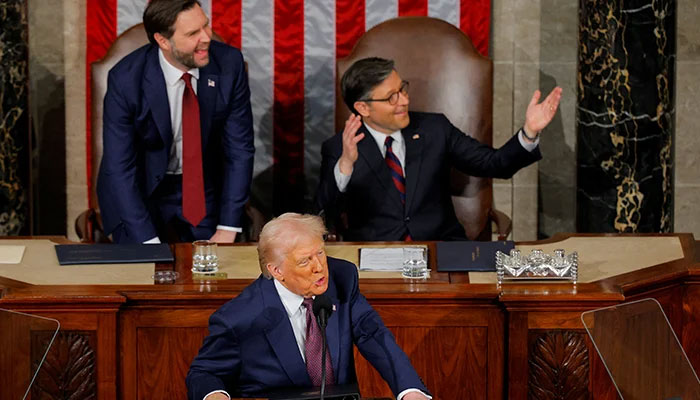Transactional ties
PM Shehbaz reciprocated with gratitude, reaffirming Pakistan’s commitment to counterterrorism
In a rare public acknowledgement, US President Donald Trump thanked Pakistan for its role in capturing the militant responsible for the 2021 Abbey Gate bombing during the withdrawal from Afghanistan. The appreciation, delivered in Trump’s first address to a joint session of Congress since his return to the White House, would no doubt have been received with relief and joy by Islamabad. Prime Minister Shehbaz Sharif reciprocated with gratitude, reaffirming Pakistan’s commitment to counterterrorism efforts and regional stability. The subsequent phone call between US National Security Adviser Michael John Glen Waltz and Deputy Prime Minister Ishaq Dar signalled what many are touting as a positive step in Pak-US relations. But does this fleeting moment of goodwill indicate a genuine reset in ties between the two countries? The answer is far more complex.
For years, Pakistan’s relationship with the US has been defined by a transactional dynamic, shaped by Washington’s security interests rather than any enduring strategic partnership. From the Afghan jihad in the 1980s to the post-9/11 war on terror, Pakistan has often found itself caught in the shifting priorities of US foreign policy. Trump’s latest acknowledgement may offer a brief diplomatic high, but experts caution against reading too much into it. Since the US withdrawal from Afghanistan, Pakistan has largely been relegated to the periphery of Washington’s geopolitical considerations. The occasional cooperation on counterterrorism notwithstanding, Islamabad is not on the US priority list -- especially under an unpredictable leader like Trump. For those within Pakistan who had pinned their hopes on Trump addressing domestic political issues, particularly the imprisonment of PTI founder Imran Khan, the speech would have been a letdown. Some PTI leaders in the US had cultivated expectations that Trump would call for Imran’s release, relying on a few favourable tweets from individuals within the new administration. But seasoned political observers had already warned that Trump had no real incentive to champion the PTI’s cause. Ultimately, Pakistan’s mention in Trump’s speech had nothing to do with internal politics and everything to do with Washington’s security concerns.
However, despite the momentary diplomatic warmth, dark clouds loom on the horizon. Reports have suggested that the Trump administration is considering imposing a new travel ban that could bar people from countries including Afghanistan and Pakistan from entering the US. Such a move would be a significant setback for ordinary Pakistanis, particularly students, professionals and families with ties to the US. Trump had in his previous term implemented a controversial travel ban on multiple Muslim-majority, and his administration’s current trajectory suggests a return to such restrictive policies. While military-to-military ties between Pakistan and the US have remained relatively steady over the years, it is the diplomatic front that requires recalibration. Pakistan must work towards diversifying its engagement with the US beyond security concerns. Strengthening trade and economic ties should be a priority, ensuring that the relationship is not solely defined by counterterrorism cooperation. However, navigating a Trumpian world is no easy task. The US president has shown little hesitation in discarding old alliances and upending traditional diplomatic norms. In such an unpredictable landscape, staying off Trump’s radar might be more beneficial than seeking his approval. Pakistan should welcome any positive engagement with the US but must do so with a clear-eyed understanding of the transactional nature of the relationship. Our takeaway? A ‘thank you’ today does not guarantee sustained goodwill tomorrow.
-
 Garrett Morris Raves About His '2 Broke Girls' Co-star Jennifer Coolidge
Garrett Morris Raves About His '2 Broke Girls' Co-star Jennifer Coolidge -
 Winter Olympics 2026: When & Where To Watch The Iconic Ice Dance ?
Winter Olympics 2026: When & Where To Watch The Iconic Ice Dance ? -
 Melissa Joan Hart Reflects On Social Challenges As A Child Actor
Melissa Joan Hart Reflects On Social Challenges As A Child Actor -
 'Gossip Girl' Star Reveals Why She'll Never Return To Acting
'Gossip Girl' Star Reveals Why She'll Never Return To Acting -
 Chicago Child, 8, Dead After 'months Of Abuse, Starvation', Two Arrested
Chicago Child, 8, Dead After 'months Of Abuse, Starvation', Two Arrested -
 Travis Kelce's True Feelings About Taylor Swift's Pal Ryan Reynolds Revealed
Travis Kelce's True Feelings About Taylor Swift's Pal Ryan Reynolds Revealed -
 Michael Keaton Recalls Working With Catherine O'Hara In 'Beetlejuice'
Michael Keaton Recalls Working With Catherine O'Hara In 'Beetlejuice' -
 King Charles, Princess Anne, Prince Edward Still Shield Andrew From Police
King Charles, Princess Anne, Prince Edward Still Shield Andrew From Police -
 Anthropic Targets OpenAI Ads With New Claude Homepage Messaging
Anthropic Targets OpenAI Ads With New Claude Homepage Messaging -
 US Set To Block Chinese Software From Smart And Connected Cars
US Set To Block Chinese Software From Smart And Connected Cars -
 Carmen Electra Says THIS Taught Her Romance
Carmen Electra Says THIS Taught Her Romance -
 Leonardo DiCaprio's Co-star Reflects On His Viral Moment At Golden Globes
Leonardo DiCaprio's Co-star Reflects On His Viral Moment At Golden Globes -
 SpaceX Pivots From Mars Plans To Prioritize 2027 Moon Landing
SpaceX Pivots From Mars Plans To Prioritize 2027 Moon Landing -
 King Charles Still Cares About Meghan Markle
King Charles Still Cares About Meghan Markle -
 J. Cole Brings Back Old-school CD Sales For 'The Fall-Off' Release
J. Cole Brings Back Old-school CD Sales For 'The Fall-Off' Release -
 GTA 6 Built By Hand, Street By Street, Rockstar Confirms Ahead Of Launch
GTA 6 Built By Hand, Street By Street, Rockstar Confirms Ahead Of Launch




